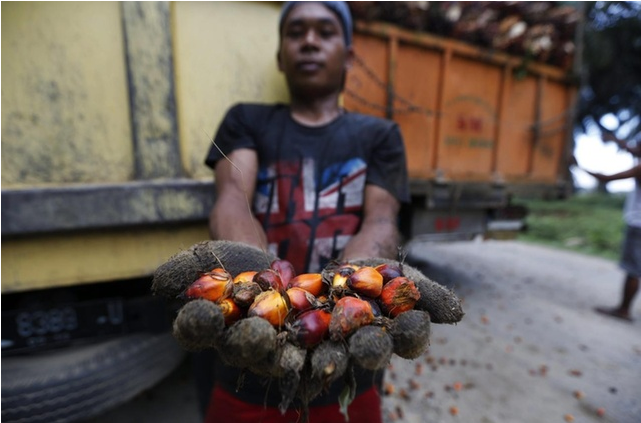Around 20% of Nestlé’s palm oil is sourced from small farmers. When it came under fire from environmental groups over its harvesting of palm oil, Swiss food giant Nestlé committed to eliminating deforestation from its supply chain by next year. But it will take another three years to come close to accomplishing that goal. The year 2010 was a tough one for Nestlé. In March of that year, the environmental activist group Greenpeace uploaded a disturbing videoexternal link to YouTube that equated eating a KitKat bar – a brand owned by Nestlé – with killing orangutans. Partly as a result of the campaign and the public’s response to it, the company temporarily cut its ties with controversial Indonesian palm oil supplier Sinar Mas and committed to ending deforestation in
Topics:
Swissinfo considers the following as important: 3.) Swiss Info, 3) Swiss Markets and News, environment, Featured, newsletter
This could be interesting, too:
Nachrichten Ticker - www.finanzen.ch writes Die Performance der Kryptowährungen in KW 9: Das hat sich bei Bitcoin, Ether & Co. getan
Nachrichten Ticker - www.finanzen.ch writes Wer verbirgt sich hinter der Ethereum-Technologie?
Martin Hartmann writes Eine Analyse nach den Lehren von Milton Friedman
Marc Chandler writes March 2025 Monthly

Around 20% of Nestlé’s palm oil is sourced from small farmers.
When it came under fire from environmental groups over its harvesting of palm oil, Swiss food giant Nestlé committed to eliminating deforestation from its supply chain by next year. But it will take another three years to come close to accomplishing that goal.
The year 2010 was a tough one for Nestlé. In March of that year, the environmental activist group Greenpeace uploaded a disturbing videoexternal link to YouTube that equated eating a KitKat bar – a brand owned by Nestlé – with killing orangutans. Partly as a result of the campaign and the public’s response to it, the company temporarily cut its ties with controversial Indonesian palm oil supplier Sinar Mas and committed to ending deforestation in its supply chain by 2020.
However, Nestlé recently admitted that it will not be able to meet that deadline. Instead, the food producer will have to settle for a 90% deforestation-free supply chain by the end of next year.
“The remaining 10% will be achieved and we will continue our efforts to be close to 100% in the next three years,” Benjamin Ware, Nestlé’s global head of responsible sourcing, told swissinfo.ch.
Calculated compromise
So, why can’t a company with over CHF90 billion ($90.5 billion) in sales last year meet its 10-year goal? According to Nestlé, a few factors are to blame.
Firstly, Nestlé sources around 20% of its palm oil from small farmers who cultivate plots of between one and 10 hectares. According to the company, it is extremely difficult to establish the boundaries of their farms and monitor for deforestation with satellites.
“We could have taken the option of removing smallholders from our supply chain but we did not,” says Ware.
The company also says that most supply chains are common to the industry and not dedicated to Nestlé alone.
“In some of them we are the only ones asking for evidence and transparency and the suppliers are not willing to offer this just for one company,” says Ware.
According to Nestlé, the transparency problem is most acute in South and Central America, especially in Guatemala, Peru, Brazil, Chile and Colombia for commodities like sugar, soy and palm oil. The multinational does not want to stop working with suppliers from this region despite their unwillingness to be transparent about their supply chains.
“This means we would end up favouring raw materials from Asia and shipping them to the other side of the planet to achieve our commitment,” says Ware.
By May of this year, Ware knew the company would not be able to meet its zero-deforestation deadline and the matter was put to the board in June. Nestlé could either keep smallholders and South America in its supply chain or meet its zero-deforestation pledge, but not both. In the end, Nestlé’s board opted for the slow and steady approach at the risk of appearing unreliable.
Not off the hook
Greenpeace agrees with Nestlé’s decision to retain smallholders and demand more transparency in global supply chains. But the environment group says it is more interested in results than promises.
“What we observe and what we care about is that all of Nestlé’s efforts so far have not led to a decrease in deforestation and forest degradation in regions where Nestlé supplies from,” says Asti Roesle, a campaigner with Greenpeace Switzerland.
Greenpeace is unhappy that the multinational continues to source palm oil and other key commodities including soy and cocoa from suppliers that are in direct violation of its no deforestation, no peat, no exploitation (NDPE) responsible sourcing policyexternal link. Campaigners also wants Nestlé to look beyond its own strategic interests and commitments.
“We believe Nestlé, as the world’s biggest food producer, needs to become part of systemic solutions that go beyond their own supply chains,” says Roesle.
Greenpeace is not alone in its view that companies need to collaborate and help reform entire sectors. The World Business Council for Sustainable Developmentexternal link, a network of 200 companies (including Nestlé) that focuses on improving sustainability in the corporate sector, also promotes an integrated approach.
The Council argues that businesses should seek deeper partnerships to take action on issues like deforestation as a sector.
“This can be hard, but is possible,” a spokesperson told swissinfo.ch. “In the case of deforestation, responsive governments must work closely with conscientious businesses and pragmatic civil society partners to address the underlying causes and complex challenges of deforestation.”
Tags: Environment,Featured,newsletter
